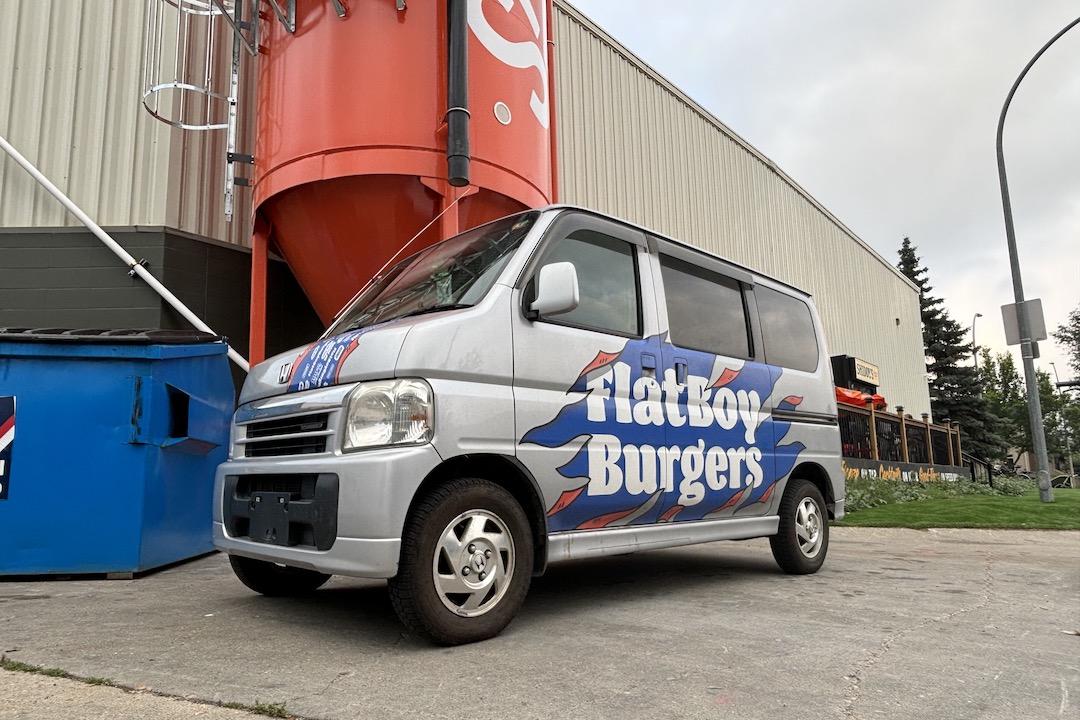Kei cars and trucks are fun-sized vehicles from Japan that Thirsty Rider Cycles, Sea Change Brewing, Flat Boy Burgers and other businesses love because they are rolling marketing campaigns and just plain fun.
In Japan, someone who drives a smaller kei car pays far fewer fees than for a standard-size automobile, making the vehicles extremely popular. In Edmonton, though, businesses especially love the slim, tall, imported Japanese mini-trucks and micro-vans that fall under the umbrella of "kei jidōsha," which translates as "light automobiles."
Why? Just ask Brett Paulitsch, the owner-operator of Thirsty Rider Cycles, who owns a kei micro-van that's branded with his company logo. "I thought they were hilarious and would be the perfect little billboard for my company," Paulitsch told Taproot in an email. "I get multiple thumbs up or laughs from people every day."
Paulitsch isn't alone. Pete Nguyen, a partner at Sea Change, Flat Boy, and Shiddy's Distilling said much the same. His mini-empire owns two branded kei vans and three branded kei trucks. "We wanted something unique and fun that we could brand and own," he told Taproot via email. "We knew that it would get attention on the road."
Paulitsch, who repairs people-powered vehicles with two wheels, uses his 1995 Subaru Sambar truck as a daily driver and for marketing. He paid around $6,000 for it. The vehicle has some disadvantages, he said, but they don't bother him. "It's freezing cold in the winter, but I love it," he said. "I never have to worry about parking (and) it's cheap on gas."
Nguyen has seen prices between $10,000 and $14,000 for kei vehicles, though he didn't say what his own fleet cost. He said a few disadvantages for most models include inadequate heating for Edmonton winters, their right-handed driving orientation, and manual transmissions.

Business owners say they like imported kei cars, mini-trucks, and micro-vans for their ability to be useful while also marketing their brands. Pictured is Flat Boy's Honda Acty kei van. (Tim Querengesser)
It isn't just businesses using the unique vehicles. Some have made a business out of finding them.
Alrick Brown worked himself "out of a job" as a Jiffy Lube franchisee around six years ago, after managers he hired largely put him out to pasture. He then decided to import the Japanese mini-vehicles as a side hustle. He opened Define Motors two years later.
Part of his income is selling the vehicles to business owners with marketing in mind. "These buyers are professional. They know what they want," Brown told Taproot. "They're not tire-kickers."
Brown said the models he sells — which must be at least 15 years old to be imported and sold here, per a Canadian trade rule — are in stellar shape and suitable for all seasons. Define Motors has mechanics who are specialized in the models and works with JDM Connection (where Paulitsch bought his truck) in Spruce Grove to import the vehicles.
Define's options as of July 26 include a 2007 and a 2005 Suzuki Every Wagon, a 2007 Suzuki Carry Automatic, and a 2004 Daihatsu Hijet Dump Truck. Small dump trucks like the Daihatsu Hijet attract another major segment of Brown's customer base: farmers. He says that they like them better than utility task/terrain vehicles (UTVs), which are commonly called side-by-sides. "The kei trucks are more useful … they're legal to drive on the road, also."
Eagle-eyed readers may notice these distinctive kei vehicles around town, especially in Old Strathcona. That's where the Shiddy's Rumpus Room recently opened, and where the Flat Boy kei van can often be spotted. It's also where Vivid Print, which has three Nissan kei vehicles, is based.
